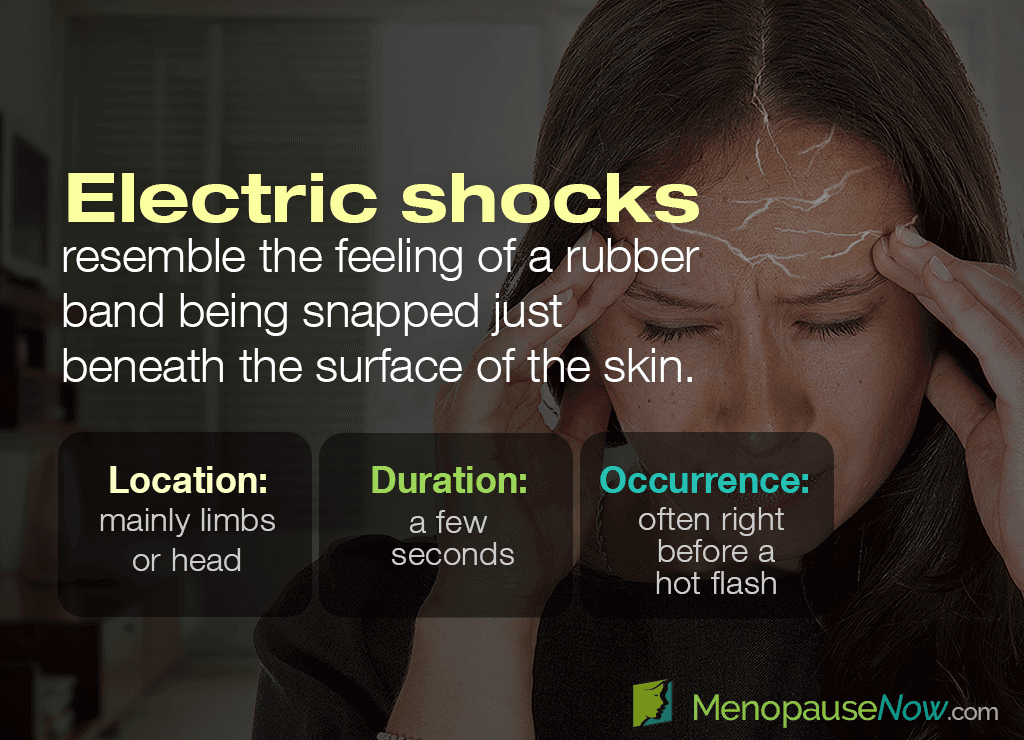Electric shocks are one of the more obscure menopause symptoms that can occur as women are transitioning out of their fertile years. As such, if it happens for the first time, confusion may set in as to if what was just felt is technically considered an electric shock.
Continue reading to learn how to recognize electric shock sensations in order to clear up any possible ambiguities.
What Does An Electric Shock Sensation Feel Like?
Because electric shock sensations have not been studied extensively, what we do know about them are generally self-reports.
Most women say that electric shocks resemble the feeling of a rubber band being snapped just beneath the surface of the skin. They occur in the head or limbs as fleeting sensations that last only seconds at a time, leaving women dumbfounded as to where they originated.
Some women also say that they feel like a stream of electrical current is running through their body. Electric shocks often occur immediately before a hot flash.
Moreover, electric shocks range in severity from being a minor annoyance to interfering with daily functions, such as walking, working, or getting dressed.
What Causes Electric Shocks?
Though electric shocks can occur for a number of reasons, the most common cause of this condition within the context of menopause is hormonal imbalance.
Estrogen works within the nervous system to send messages to the brain, which interprets these messages and conveys them to other parts of the body. It is believed that when estrogen levels fluctuate radically, these messages may be misconstrued, causing electric shocks beneath the skin.
There may also be other medical causes of electric shocks, including, but not limited to:
- Peripheral neuropathy
- Vitamin B12 deficiency
- Herniated disk
- Spinal stenosis
- Arachnoiditis
How Can I Treat Electric Shocks?
Electric shock sensations are treated on a case-by-case basis, depending on their underlying cause.
For otherwise healthy menopausal women passing through the menopause transition, the most effective line of treatment will be to address the hormonal imbalance provoking the sensations. In order to do this, natural and effective electric shock sensation treatments combine a mix of lifestyle changes alongside the use of alternative medicine for optimal endocrine and nervous system health.
Recommendations
If you think your electric shock sensations is not just a symptom of menopause or may be symptomatic of a more serious health complication, it is important to talk with your doctor. Only he or she will be able to run the appropriate diagnostic testing needed to pinpoint the root cause.
Sources
- American Association of Neurological Surgeons. (n.d.). Herniated Disk. Retrieved October 17, 2019, from https://www.aans.org/Patients/Neurosurgical-Conditions-and-Treatments/Herniated-Disc
- American Cancer Society. (2018). What Is Peripheral Neuropathy? Retrieved October 17, 2019, from https://www.cancer.org/latest-news/what-is-peripheral-neuropathy.html
- Cleveland Clinic. (2019). Arachnoiditis. Retrieved October 17, 2019, from https://my.clevelandclinic.org/health/diseases/12062-arachnoiditis
- Harvard Health Publishing. (2019). When nerves get damaged. Retrieved October 17, 2019, from https://www.health.harvard.edu/diseases-and-conditions/when-nerves-get-damaged
- Simpson, K.R. & Bredesen, D. (2006). The Perimenopause and Menopause Workbook. California: New Harbinger Publications, Inc. Available from Google Books.


